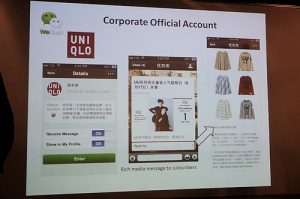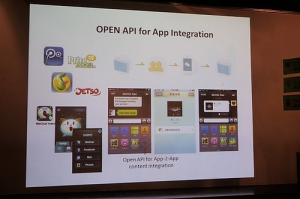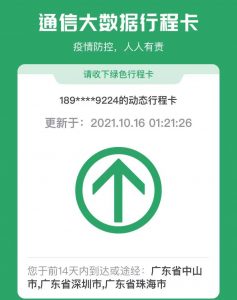
Introduction
WeChat is a social networking app controlled by Tencent. Much like Facebook, it allows people to communicate and share their lives on the platform. With the continuous development of WeChat, it has a large user group, and they are very active. So far, 10.9 billion users open WeChat, and 330 million make video calls every day. 780 million users entered moments and 120 million posted moments (Tencent, 2021). People can share photos, short videos in moments. They can also read articles on official accounts and use many mini-programs. This shows that WeChat has been deeply integrated into users’ daily lives in China.
Source: YouTube-https://youtu.be/cYDLL0oS2uk
Background
WeChat is also growing and innovating. WeChat was promoted by Guangzhou Research Center in early 2011 and is called “Weixin” as an instant communication application (Boyd, 2017). At that time, it was different from other communication software only in voice call and voice message function (Boyd, 2017). This difference gives WeChat strong market competitiveness. In 2012, its registered users have exceeded 100 million (Boyd, 2017). The continuous development of the WeChat platform has also gradually increased its functions. The development of the “moments” function is an important milestone in the development of WeChat. People can start to share their life through pictures and short videos, as well as see the latest news from friends. WeChat has become an integral part of China’s social scene, with not only communication functions but also app stores and search functions. That makes it similar to Facebook, WhatsApp, and Google, but WeChat is more like a combination of them (Boyd, 2017). Today, WeChat has grown from a common messaging platform to a ubiquitous social software in China.
Source of income
Although WeChat is a social app, it doesn’t own its unique product, but it still has its revenue stream.
Collaborate with other software
WeChat Pay, a digital wallet for WeChat users, allows people to pay for things simply by swiping. In the process, the platform builds new value systems and economies (Van Dijck, Poell, & de Waal, 2018). Users can send red envelopes, receive gifts, pay fees, and more through WeChat Pay. Due to the convenience and speed of WeChat Pay, it makes real money almost obsolete. WeChat Pay has become the multi-party infrastructure in China’s digital economy (Kloet, Poell, Guohua & Yiu Fai, 2019), which not only facilitates people’s lives but also brings WeChat business cooperation opportunities. For example, cooperate with bike-sharing companies. Online platforms were originally carriers of “participatory society” and “sharing economy” (John & Nicholas, 2018). As the term sharing economy began to enter the mainstream, industries such as bike-sharing also began to boom. Payment features such as WeChat allow it to work with such companies. In the case of Mobike, WeChat users can use their WeChat wallets to pay for rides.


Infrastructure platform
Platform owners can provide a variety of services on digital platforms (Mansell, Robin, Steinmueller, & Edward, 2020). Therefore, WeChat innovates the service of mini-programs. Of the apps people download, more than 25% are never used (Boyd, 2017). This not only takes up storage space for users but also makes it difficult for these applications to grow. But the WeChat mini-programs are different. They skip the downloader step and allow users to use the apps directly within WeChat. Nowadays, users can do whatever they want to do online on WeChat. This gives WeChat the attributes of infrastructure on the Internet. Infrastructure platforms can connect data streams and fuse information (Van Dijck, Poell, & de Waal, 2018). Therefore, WeChat has built a link between social production and people’s lives. This is not only convenient for users but also a boon for small internet businesses. WeChat provides a platform for them to enter the Internet, and these companies can use mini-programs to reach the masses.



Advertising revenue
In addition to mini-programs, WeChat can also make money through advertising. Due to its large audience, WeChat has become a good channel to deliver advertising information to customers (Mansell, Robin, Steinmueller, & Edward, 2020). Therefore, advertisers pay platform owners to place ads. Promotion payments began in 2015 (Boyd, 2017), so advertising revenue has not become WeChat’s main source of income.
Concerns
Information Leakage
As WeChat continues to grow, the public has begun to raise some concerns. Data-intensive digital platforms scale by attracting both players: users and advertisers (Mansell, Robin, Steinmueller, & Edward, 2020). This raises consumer concerns, especially about security, accuracy, and privacy (Van Dijck, Poell, & de Waal, 2018). WeChat mini-programs have exposed these risks. China Coordination Center tested 50 mini-programs and found that 90% of the application source code did not take protection measures for users’ key and sensitive information (PingWest, 2021). The platform capitalism proposed by Nick Srnicek (2018) is also one of the reasons for information exposure. To achieve a monopoly, platforms extract more data from users to promote their businesses (Srnicek, 2018). While this can broaden the scope of the platform and attract more users, it can create the risk of user privacy leakage.
Unfair Competitions
In addition to the concerns of individual consumers, social values such as fairness and equality have also begun to be concerned (Van Dijck, Poell, & De Waal, 2018). Platform capitalism can make companies gradually develop into monopolies, so monopoly has become a point of social concern. The growth of digital platform scale leads to economies of scale and scope, which leads to a market structure: natural monopoly (Mansell, Robin, Steinmueller, & Edward, 2020). WeChat has successfully occupied a dominant market position in China. This undermines market diversity, as users are reluctant to switch to different platforms when there is one dominant platform in the market (Mansell, Robin, Steinmueller, & Edward, 2020). Unless other platforms offer a completely different service, it’s hard for them to compete with WeChat. This has left some smaller platforms only able to enter the Internet through cooperation with WeChat to gain their own users. Although this can bring profits to WeChat, it will reduce the diversity of the media market and make it less innovative.

Government regulation and cooperation
WeChat is not only a messaging app and a monetization platform, it also has close ties to the government. Unlike western software, it is regulated and interfered with by the government (Kloet, Poell, Guohua & Yiu Fai, 2019). Some platforms simply claim to serve the public interest (Van Dijck, Poell, & De Waal, 2018), but WeChat does. WeChat’s powerful database and unique monopoly position allow it to cooperate with the government. Take WeChat’s health code as an example. In order to prevent and control COVID-19, WeChat has set up mini-programs such as health codes and travel codes. By scanning these QR codes, the country can obtain data on people’s travel and health status. This effectively promoted the country’s epidemic prevention and control, and at the same time, ensured people’s health.



References
Boyd, c. (2017). WeChat: The evolution and future of China’s most popular app. medium. Retrieved 15 October 2021, from https://medium.com/swlh/wechat-the-evolution-and-future-of-chinas-most-popular-app-11effa5639ed.
De Kloet, J., Poell, T., Guohua, Z., & Yiu Fai, C. (2019). The platformization of Chinese Society: Infrastructure, governance, and practice. Chinese Journal of Communication: The Platformization of Chinese Society, 12(3), 249–256.
John, Nicholas A. (2018). Sharing Economies. In The Age of Sharing. Cambridge: Polity. pp. 69-97.
Mansell, Robin, and Steinmueller, W. Edward. (2020). Advanced Introduction to Platform Economics. Cheltenham, Edward Elgar, pp. 35-54.
Srnicek, N. (2018). Capitalisme De Plateforme. Lux Éditeur.
Tencent. Tencent.com. (2021). Retrieved 15 October 2021, from https://www.tencent.com/zh-cn.
Van Dijck, J., Poell, T. & de Waal, M. (2018). The Platform Society. Oxford: Oxford University Press, pp. 5-32 (‘The Platform Society as a Contested Concept’).
WeChat Mini program pose significant risk for personal data leakage – PingWest. PingWest. (2021). Retrieved 15 October 2021, from https://en.pingwest.com/w/9003.